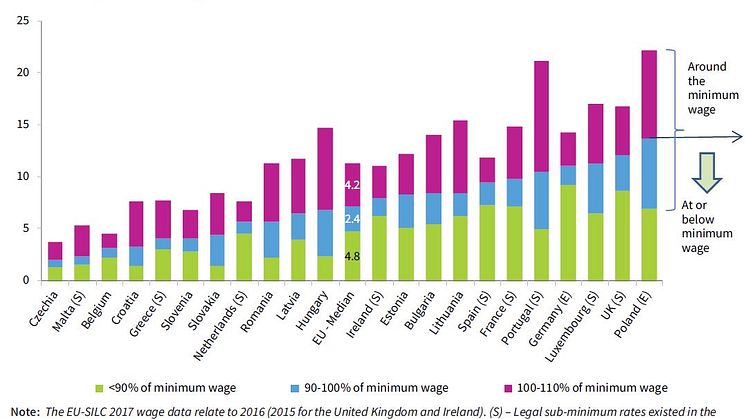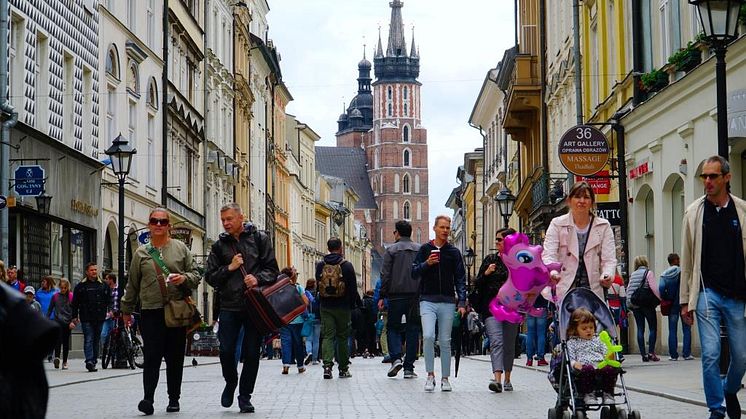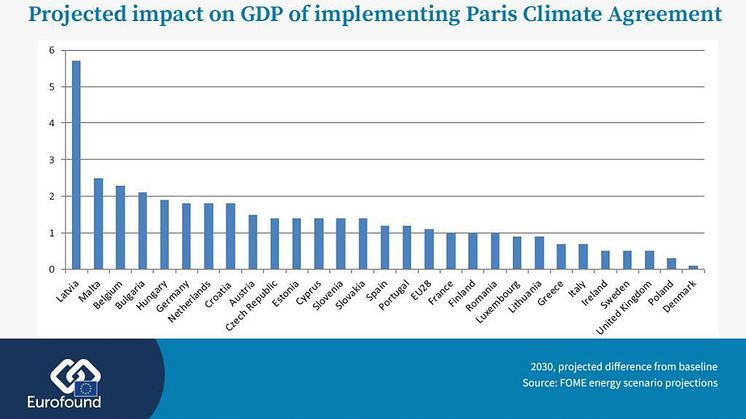
News -
Minimum wages have increased across Europe, but will low-wage workers feel the difference?
There have been wage increases for minimum and low-wage earners in most EU Member States, with rises in statutory minimum wages in almost all countries since January 2018; including significant increases in Lithuania, Spain, Greece and low-wage newer Member States. While these increases are welcomed as good news for minimum wage workers, Eurofound’s research shows workers may not automatically feel the positive impacts of these changes in terms of income and reductions in wage inequality. This is because these increases can be offset by changes in taxation; that there are many groups of workers that do not avail of minimum rates; and, although women are proportionately more likely to work in minimum wage jobs, increasing the minimum wage may not mean closing the gender pay gap.
Several Member States in Europe have looked to address issues such as in-work poverty and the gender pay gap through increases to the minimum wage - but have pushed through changes without fully adhering to existing social dialogue processes. As a result, revisions to rates may not have been evidence based. For example, as women are more likely to be employed in minimum wage or sub-minimum wage jobs, it is assumed that increasing the minimum wage can narrow the gender pay gap, but changes to the minimum wage can decrease low paid women’s employment and increase the level of non-compliance. They can also produce ‘ripple effects’, by potentially increasing the wages of higher earners, where men are more represented, either dampening the impact, or even exacerbating the issue.
In a number of Member States there are groups of workers, such as younger workers or seasonal workers – to which the statutory rate does not apply. Depending on implementation, minimum wage changes could either increase their wages, or compound existing wage inequality. There is also the issue of taxation: in Lithuania minimum wage workers saw a large rise in the nominal rate – at 39% the nominal increase was the highest in the EU – but this was mainly a gross figure on their payslips, as changes in tax and social contributions meant that the increase to net pay was a more modest, but not insignificant, 7.5%.
There were, nonetheless, some significant changes to minimum wages that have the potential to benefit large numbers of workers. Spain experienced a significant 22% increase to its minimum wage. Given the size of the Spanish economy, this is possibly the most significant increase on European level since Germany introduced a minimum wage in 2015. There was also a significant change in Greece, which increased its minimum wage by over 10%, the first increase since 2012.
Countries with the highest minimum wage rates tended to have more modest increases, ranging from around 2% in France, Belgium, the Netherlands, Ireland and Germany (annualised), to a slightly higher increase of 3.6% in Luxembourg. In real terms, adjusting for inflation, these increases were smaller, for example, 0.1% in France and 0.16% in Belgium. Latvia was the only country that did not increase its statutory minimum wage, experiencing a real term decline of 2.9%.
Overall, these increases in minimum wage rates took place in the context of a favourable economic climate, combined with continuing labour shortages in certain areas; which increased the bargaining power of workers, and made it possible for businesses to pay higher wages. Europe also played a role, with the reference to ‘adequate minimum wages’ in the European Pillar of Social Rights sparking national debate on the issue.
Eurofound’s annual review of minimum wages in the EU is significant in that it not only looks at nominal and real terms increases in statutory minimum wages, but also analyses minimum wages in Member States that do not have a statutory rate. It looks at the political processes, collective bargaining structures, and other issues that are pivotal in setting rates. It also looks at long-term trends in minimum wages, and how minimum and low-wages impact different groups of workers.
- Download the report in full: Minimum wages in 2019 - Annual review





